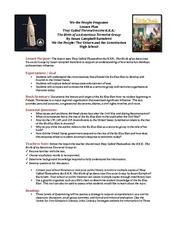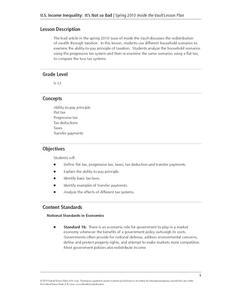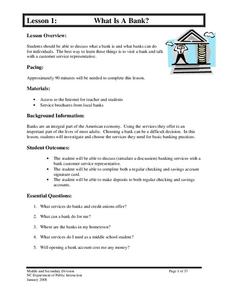Curated OER
U.S. and Iroquois Governments
Eighth graders compare the roles and functions of the different branches of the Iroquois and US governments, and the the principles of separation of power.
Curated OER
The Role of Government
Students are introduced to the economic roles of the federal government. Using the internet, they read information related to government spending and the actual dollar amounts attached to budget items. In groups, they develop their own...
Curated OER
The Need for Government
Learners, in groups, play a game of skill in which the outcome depends on decisions the other players make. After playing they discuss the game and how they liked playing a game that was controlled by the decisions othe rpeople made. ...
Curated OER
Compare the United States Government with Other Political Systems
Young scholars explore the U.S. form of government and illustrate other forms of government found throughout the world. They explain the similarities and differences between the U.S and other governments.
Curated OER
How Congress Works
Students study the role of the U.S. Congress in American government as described in the Constitution. In this U.S. government activity, students watch an overhead about 'public criticisms' in the legislative process and complete a quiz....
Curated OER
What Is the Role of the President in the American Constitutional Government?
Students read about the role of the president. In this US government lesson, students read about the role of the president as stated in the US Constitution. Students examine issues of presidential power and identify various checks and...
Curated OER
Should US Officials & Health Professionals be Investigated for War Crimes?
Students explore ethical issues. In this human rights lesson, students read articles and documents related to torture used in government investigations and if medical ethical guidelines were adhered to. Students respond to discussion...
Curated OER
My Secret War: Lesson 8
Fifth graders explore American history by viewing videos on the Internet. In this Japanese internment lesson, 5th graders discuss the politics that took place between America and Japan during WWII and why it was necessary to incarcerate...
Curated OER
Constitution Lesson Plan
Third graders identify roles of Declaration of Independence and U.S. Constitution in establishing new country, create posters with their ideas about each part of Constitution, and explain three branches of government, including their...
Curated OER
Lesson 3: U.S. Neutrality and the War in Europe, 1939-1940
Students examine the U.S. neutrality policies that preceded American involvement in World War II. In this World War II instructional activity, students explore the events in Europe from 1939 to 1940 and Roosevelt's decision to give...
Curated OER
Another King George?
Students study the differences between presidents and kings, and constitutional monarchs and despots. They examine why the US has a president instead of a king.
Curated OER
The Called Themselves the K.K.K.; The Birth of an American Terrorist Group
How did Ku Klux Klan develop and flourish in the US? How did the government respond to acts of terrorism conducted by the KKK following the Civil War? How does the government respond to acts of terrorism today? This resource launches a...
Federal Reserve Bank
U.S. Income Inequality: It's Not So Bad
What is the difference between a flat tax, progressive tax, tax deduction and transfer payments? Pupils examine the ability-to-pay principle of taxation through discussion, problem solving, and a variety of worksheets on topics from US...
School Improvement in Maryland
Court Proceedings Civil Cases
What's the difference between civil and criminal law? How do the court proceedings differ in these two types of trials? How do the standards of proof differ? Why do these differences exist? As part of their examination of the US court...
Curated OER
Little House in the Census: Almanzo and Laura Ingalls Wilder
How would you use census data from 1880-1900? Here are a set of ways you can incorporate the book Little House on the Prairie and US census data from that time period. Learners will research the validity or the book based on factual...
Curated OER
Photography and the National Park Service
During the 1800s the United States was expanding westward; land was there for the taking. Kids explore how some early photographers used their photography to influenced the US Congress to save areas like Mirror Lake. They complete a...
Curated OER
The Great Depression and Everyday Life
Examine everyday life during the Great Depression, as well as the effects if the Depression on American population, society, and economy. Learners write who, what, where, when, and why summaries of a person who relocated to California...
College Board
Balance of Power Between Congress and the President
Three branches of government help create a system of checks and balances. A helpful resource provides a series of articles regarding the balance of power between the legislative and executive branches of government. Historians answer...
Alabama Department of Archives and History
Alabama's 1901 Constitution: What Was at Stake?
Who should be able to vote? As part of a study of the 1901 Alabama Constitution, class members examine primary source document that reveal the reasons the authors gave to support their positions on this question and their assumptions in...
What So Proudly We Hail
Life, Liberty, and the Pursuit of Happiness: A Lesson on the Declaration of Independence
What does it mean to say that a right is unalienable? How did the founding fathers convey this revolutionary concept in the Declaration of Independence? Engage in a close reading and analysis of the Declaration of Independence, and...
National Endowment for the Humanities
How to Win a World War
High schoolers are have begun to learn the art of diplomacy with each other, but do they understand how diplomacy works at a global level? The second in a series of four lessons, guides scholars in evaluating primary sources. The why...
Curated OER
In Legal Limbo
Newspapers are great learning tools. They act as a conduit for current events, reading comprehension, and critical thinking. Here, pupils read a New York Times article regarding US immigration law under the Obama administration and...
North Carolina Department of Public Instruction
What Is A Bank?
You're never too young to learn about banking and personal finance. Use a set of seven banking lessons to teach middle schoolers about checking and savings accounts, interest rates, loans and credit cards, and safety deposit boxes.
Roy Rosenzweig Center for History and New Media
Immigration: Why Come to the United States?
Don't limit your curriculum to texts! Young historians listen to a song, read an interview, and examine a cartoon as they explore motivations for immigrating to the US in the late 19th and early 20th centuries.

























